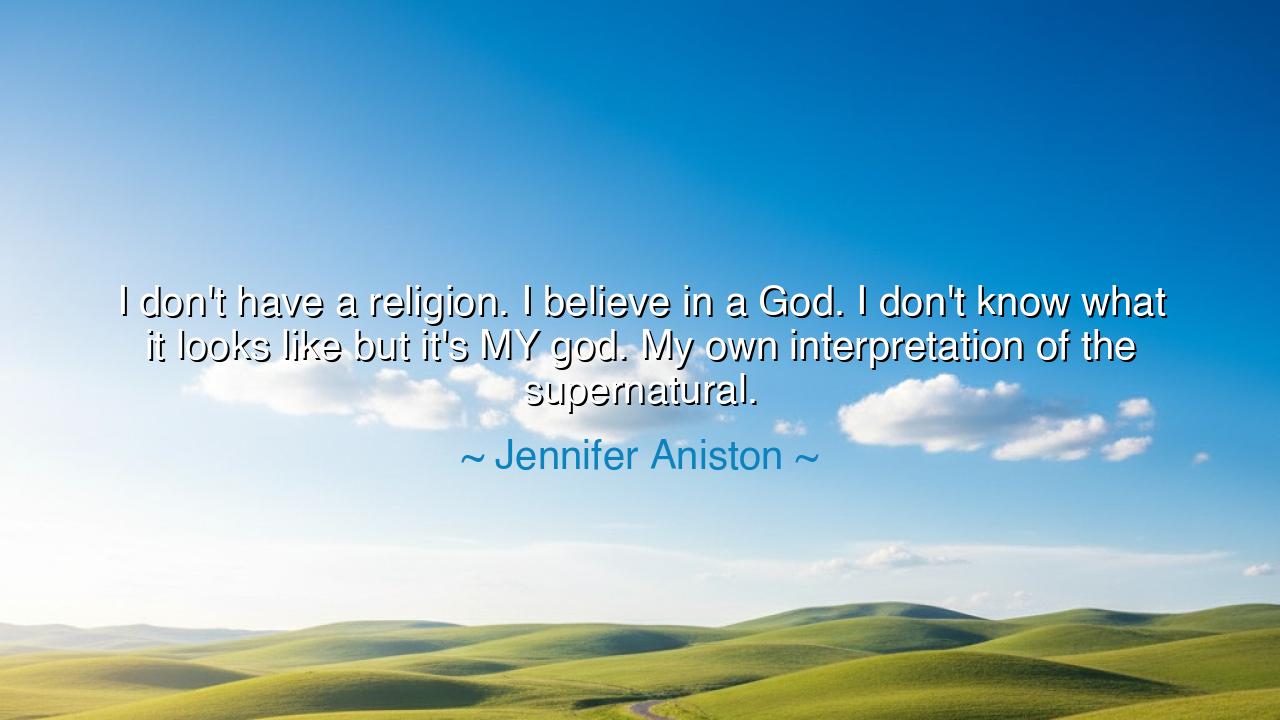
I don't have a religion. I believe in a God. I don't know what it
I don't have a religion. I believe in a God. I don't know what it looks like but it's MY god. My own interpretation of the supernatural.






“I don’t have a religion. I believe in a God. I don’t know what it looks like but it’s MY god. My own interpretation of the supernatural.” — Jennifer Aniston
Hear now, O seeker of wisdom, the quiet yet profound confession of a soul unbound. When Jennifer Aniston spoke these words, she was not rejecting faith — she was reclaiming it. Her voice echoed the longing of countless souls in a modern world filled with noise and division, where religion so often becomes a wall instead of a bridge. In her statement shines a truth as old as the stars: that the divine is not found only in temples, nor confined to a single name or image, but discovered in the heart’s own interpretation of the supernatural — a personal and intimate communion between the human spirit and the mystery that breathes life into all things.
The origin of her words lies in the age of individual awakening — an age when humanity began to look inward, not as rebellion, but as revelation. For centuries, men and women were taught to inherit their beliefs from birth, to worship what others had defined, and to follow paths carved by ancestors long gone. Yet in every generation, there arise those who seek to see the divine with their own eyes, to know not what they were told, but what they feel in the depths of their being. Such was the spirit behind Aniston’s declaration: that belief must be living, personal, and honest — not merely a repetition of another’s creed.
To say, “I believe in a God,” without defining it, is to admit both humility and courage. Humility, because one confesses ignorance — for who among mortals can truly comprehend the Infinite? And courage, because to believe without clarity is to walk by faith alone. The ancients called this the path of seekers, those who wander not in disbelief, but in wonder. Like Socrates, who declared that wisdom begins with the admission of one’s ignorance, Aniston’s words remind us that the divine cannot be caged in definition. It is not a face, but a presence; not a doctrine, but an experience that whispers through art, through love, through quiet moments when the soul feels seen by something greater.
Consider the story of Ralph Waldo Emerson, the American philosopher who broke away from the rigid faith of his time. He stood before his congregation and declared that the divine spark lives within every soul, and that each person must find God not through ritual, but through self-awareness. The church rejected him; the world later revered him. Like Emerson, Aniston speaks for those who find divinity not in dogma, but in authenticity — for to know God in one’s own way is to honor the sacred individuality that the Creator Himself bestowed upon every heart.
Her words also reveal a deep yearning for connection — not to an institution, but to the mystery that animates life. She does not deny the supernatural; she embraces it through her own lens. This is the essence of spirituality — the recognition that we are part of something beyond comprehension, yet deeply personal. The sun, the breath, the rhythm of compassion — all these are threads woven into the same unseen fabric. To interpret the supernatural is to listen to the music of creation and find your own melody within it.
The lesson in this teaching is clear: your relationship with the divine must be your own. Do not let fear or tradition imprison your soul. Let your faith grow like a living tree — fed by your experiences, shaped by your struggles, and reaching ever upward toward the light of understanding. Seek your God, not in the voices of others, but in the stillness within you. Speak to it in gratitude, listen for it in silence, and live by the truths it plants in your heart.
Therefore, O listener, walk boldly on your spiritual path, but walk with reverence. Let your belief be fluid, not frozen — a river that changes with time yet always flows toward the sea of unity. The divine does not demand conformity, but sincerity. And when you, like Jennifer Aniston, dare to say, “I don’t know what my God looks like, but I believe,” you are already closer to truth than those who claim to know all. For the heart that seeks with honesty is itself a temple — and in that temple, unseen yet ever present, dwells the living light of your own God.






AAdministratorAdministrator
Welcome, honored guests. Please leave a comment, we will respond soon